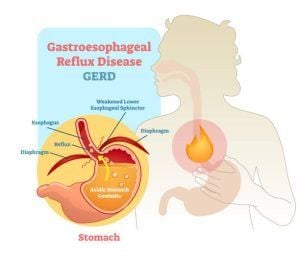Với một số người, vị cay không thể thiếu trong bữa ăn của họ. Đồ ăn cay giúp họ cảm thấy ngon miệng hơn khi dùng bữa. Tuy nhiên, thói quen sử dụng đồ ăn cay quá mức có thể không mang lại lợi ích sức khỏe.
1. Những tác hại của đồ ăn cay quá mức
Sử dụng đồ ăn cay quá mức có thể mang lại một số tác hại cho sức khỏe, bao gồm:
- Ăn cay quá mức gây đau dạ dày
Khi ăn quá cay sẽ làm cho dạ dày bị ảnh hưởng. Những dấu hiệu của bệnh dễ dàng nhận biết được như: Nôn ói, ợ chua, nóng rát dạ dày hoặc có thể gây nên tình trạng trào ngược dạ dày. Ngoài ra, mức độ cay càng mạnh thì tình trạng viêm loét dạ dày- tá tràng càng trở nên nặng.
Ăn cay quá mức gây mất ngủ
Khi sử dụng ớt trong bữa ăn có thể khiến cho nhiệt độ cơ thể tăng lên, ảnh hưởng nghiêm trọng tới giấc ngủ trong ngày. Do đó, ăn quá nhiều đồ cay là nguyên nhân gây nên tình trạng khó đi vào giấc ngủ.
- Mất cảm giác ngon miệng với thực phẩm tự nhiên
Những người thường xuyên sử dụng ớt hay đồ ăn cay quá mức trong bữa ăn hàng ngày có thể khiến cho vị giác của lưỡi quá tải, dẫn đến việc tiếp nhận các chất trong thực phẩm bị ảnh hưởng, thậm chí làm mất cả khả năng phân biệt vị. Do vậy, nếu ăn cay quá mức một cách thường xuyên thì có thể không có lợi cho người sử dụng. Vì vậy, bạn nên ăn cay 2-3 lần/tuần và ăn với tần suất ngắt quãng.
- Ăn cay quá mức gây nóng trong người
Sử dụng nhiều ớt với tần suất thường xuyên cùng với mức độ cay nhiều có thể gây nên tình trạng loét miệng hoặc nổi mụn nhọt, nóng rát ở hậu môn cũng như các cơ quan khác... Ngoài ra, trong bột ớt hoặc ớt tươi khi bị mốc sẽ hình thành chất độc aflatoxin, có khả năng gây ngộ độc và các bệnh ung thư. Tuy nhiên, thành phần của ớt chứa khá nhiều vitamin C, D nên mang lại nhiều lợi ích cho sức khỏe...
Với những người cơ thể ốm yếu, mắc bệnh dạ dày, đại tràng, sỏi mật hay những người thường xuyên sử dụng thuốc đều không nên sử dụng ớt trong bữa ăn hàng ngày vì ớt tươi có thể ảnh hưởng trực tiếp đến sức khoẻ của người bệnh.

- Ăn cay quá mức có thể gây nổi mụn
Thực phẩm cay nóng có tính hút ẩm, do vậy sẽ khiến cho làn da trở nên thô ráp, đồng thời hợp chất cay nóng còn gây kích thích làn da khiến cho da dễ bị nổi mụn hơn. Do đó, những người có trạng thái da khô nên hạn chế sử dụng các loại thức ăn cay nóng, có hàm lượng muối cao...
Còn đối với phụ nữ đang trong thời kỳ mang thai thì đồ ăn cay sẽ ảnh hưởng đến mẹ và bé. Đặc biệt, mẹ mang thai ăn đồ cay có thể gây nên các bệnh dị ứng cho trẻ sau này hoặc khi trẻ sinh ra dễ bị rôm sảy, nóng trong người.
Đối với bà mẹ nuôi con bú cũng không nên sử dụng thực phẩm quá cay, bởi vì nồng độ chất cay có thể đi qua sữa và ảnh hưởng đến trẻ. Mặt khác, bà mẹ ăn quá nhiều chất cay cũng gây nên tình trạng nóng trong, khó ngủ, ...
2. Những tác dụng hữu ích của ớt cay
Mặc dù ăn cay quá mức sẽ dẫn đến một số nguy hại cho sức khoẻ, nhưng nếu sử dụng với liệu lượng vừa đủ và đúng cách thì vị cay của ớt cũng có thể mang lại một số lợi ích cho sức khỏe như sau:
- Ăn cay có thể giúp giảm đau
Hợp chất capsaicin trong ớt không có mùi, không vị nhưng có khả năng kích thích làm giảm đau. Người ta thường sử dụng capsaicin như một phương thức giảm đau hiệu quả từ tự nhiên trong các trường hợp sau phẫu thuật, đau nhức xương khớp, đau miệng hay một số bệnh ngoài da.
- Ăn cay có thể giúp ngừa tai biến tim mạch
Vị cay của ớt có thể giúp cho máu lưu thông tốt hơn, ngăn ngừa các nguy cơ tai biến tim mạch cũng như giúp hạ huyết áp, giảm lượng cholesterol trong cơ thể.
- Ăn cay có thể giúp hạn chế tình trạng ăn vặt
Đối với những người mắc bệnh cảm cúm, cảm lạnh và những bệnh liên quan đến đường hô hấp, ớt sẽ giúp cơ thể ngăn ngừa hiệu quả.
- Ăn cay có khả năng kháng viêm, chống suy nhược
Ớt trong khẩu phần ăn với vị cay đặc trưng có khả năng giúp kháng viêm, đặc biệt các bệnh liên quan đến khớp như viêm khớp. Ngoài ra, nó cũng có khả năng chống suy nhược cơ thể hiệu quả.

- Ăn cay có khả năng cải thiện hệ tiêu hoá
Mặc dù, ăn cay quá mức có thể làm thay đổi men tiêu hoá, nhưng nếu ăn cay với liều lượng phù hợp thì lại giúp tăng tiết dịch vị, tiêu hoá và ăn ngon miệng hơn, đồng thời tránh được tình trạng đầy hơi.
- Ăn cay có khả năng giúp giảm cân hiệu quả
Trong ớt cũng như trong các thực phẩm có vị cay như tiêu... chứa hợp chất capsaicin giúp đốt cháy nhiều năng lượng hơn ngay sau bữa ăn, tăng quá trình trao đổi chất của cơ thể. Từ đó, giúp cho bạn có cảm giác no và giảm cân hiệu quả.
Mặc dù việc ăn cay quá mức có thể gây ra những ảnh hưởng tới sức khoẻ, nhưng nếu điều chỉnh và sử dụng hợp lý thì vị cay này sẽ mang lại nhiều lợi ích cho sức khỏe con người.
Để đặt lịch khám tại viện, Quý khách vui lòng bấm số HOTLINE hoặc đặt lịch trực tiếp TẠI ĐÂY. Tải và đặt lịch khám tự động trên ứng dụng MyVinmec để quản lý, theo dõi lịch và đặt hẹn mọi lúc mọi nơi ngay trên ứng dụng.
To arrange an appointment, please call HOTLINE or make your reservation directly HERE. You may also download the MyVinmec app to schedule appointments faster and manage your reservations more conveniently.
Để đặt lịch khám tại viện, Quý khách vui lòng bấm số HOTLINE hoặc đặt lịch trực tiếp TẠI ĐÂY. Tải và đặt lịch khám tự động trên ứng dụng MyVinmec để quản lý, theo dõi lịch và đặt hẹn mọi lúc mọi nơi ngay trên ứng dụng.





